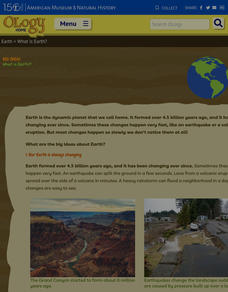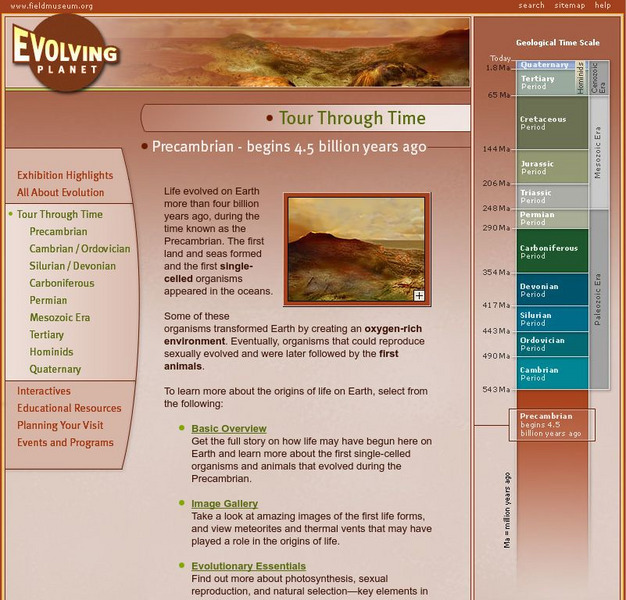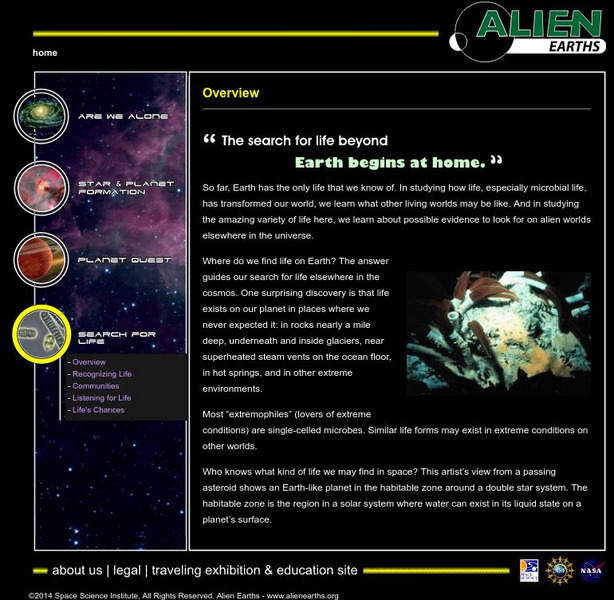American Museum of Natural History
What is Earth?
Humans have only inhabited Earth for a short part of its existence. An online resource explains how scientists use clues from rocks and fossils to piece together information about Earth prior to humans. The online instruction includes...
American Museum of Natural History
Journey to the Stars
Fifteen detailed pictures and informative captions delve deep into the exploration of stars—their life cycle and importance in the universe.
American Museum of Natural History
What is Marine Biology?
A marine environment covers the majority of the earth but is arguably the least understood. Teach young scientists about the characteristics of oceans and ocean species using an interactive online lesson. The in-person or remote learning...
Other
Space Science Institute: Alien Earths: Star and Planet Formation
Learn about the lives of stars, and how stars and planets form. The Interactive activity, 'Planet Families' requires Adobe Flash and cannot be launched.
Other
Space Science Institute: Alien Earths: Planet Quest
New technologies are continually being developed to help us look deeper into space to discover new planets and to search for other intelligent life forms. Learn about some of these initiatives here.
PBS
Pbs: Journey to Planet Earth: Rivers of Destiny
Journey to four major river systems - the Mississippi, Amazon, Jordan and Mekong rivers - and take a look at the challenges happening to the people whose livelihood hinges around them.
The Field Museum
Field Museum: Exhibits: Evolving Planet: Precambrian
This interesting tour examines how life began on earth, provides images of the first life forms, and delves into the role that photosynthesis sexual reproduction, and natural selection played in the the Precambrian period. Listen to...
Nature Conservancy
Nature Conservancy: Planet Earth: Deserts and Aridlands
The desert areas in the United States that this organization is working to protect are portrayed through photographs and videos, showing the beauty of the landscapes and the diversity of life forms there.
Other
Space Science Institute: Alien Earths: Search for Life
How do you recognize life on another planet? What tests do scientists use to determine if something is a life form when they are many light years away from being able to observe it directly? Try your hand at interactives to create a...
National Earth Science Teachers Association
Windows to the Universe: Our Solar System
Our solar system is filled with a wide assortment of celestial bodies - the Sun itself, our eight planets, dwarf planets, and asteroids - and on Earth, life itself! The inner solar system is occasionally visited by comets that loop in...
abcteach
Abcteach: Earth Day Activities
[Free Registration/Login Required] How can you treat the earth with more respect? Check out this resource featuring links to elementary activities to celebrate Earth Day. You will find word searches, crossword puzzles, reading...










